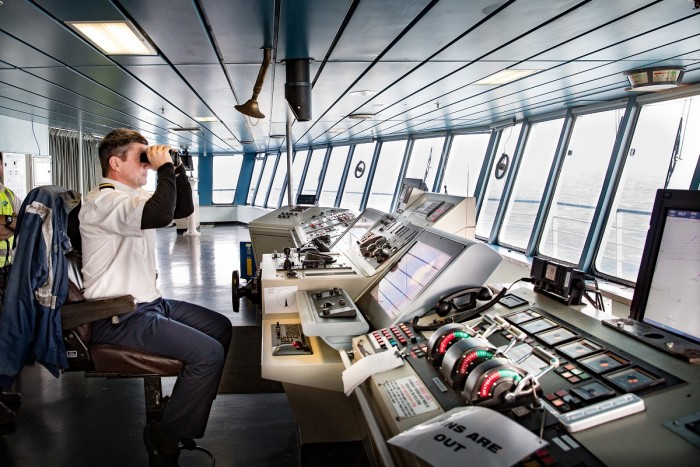Ship's Officer
Āpiha Kaipuke
Alternative titles for this job
Ship's officers navigate and control the safe operation of a ship and supervise and co-ordinate the activities of deck crew.
Pay
Ship's officers usually earn
$60K-$130K per year
Source: Maritime New Zealand, 2017.
Job opportunities
Pay
Pay for ship's officers varies depending on rank, experience and the type of vessel they work on.
However, they usually earn between $60,000 and $130,000 a year.
Source: Maritime New Zealand, 2017.
(This information is a guide only. Find out more about the sources of our pay information)
What you will do
Ship's officers may do some or all of the following:
- navigate and control ships
- take charge of ships when on watch
- arrange repairs, fuel and supplies
- supervise the loading, unloading and storage of cargo
- organise crew activities on deck
- organise ship security.
Skills and knowledge
Ship's officers need to have knowledge of:
- the requirements of running and supplying a ship
- how to navigate and control a ship
- how to read charts and identify hazards
- the logistics of working with cargo, ballast and fuel
- maritime laws and requirements
- safety procedures and methods such as firefighting, rescue, and collision prevention.
Working conditions
Ship's officers:
- usually work shifts and are on call 24 hours a day while at sea. When working for international shipping companies, ship's officers often work three months at sea followed by three months' leave, though this depends on the company and ship
- work in all weather conditions
- usually travel to ports around New Zealand or travel internationally to foreign ports.
What's the job really like?

Chris O'Leary
Second Officer
How did you get into the job of ship's officer?
"I trained for seven years. I didn’t plan to be an officer – I started doing a summer job in hospitality on the ship, then a deckhand trainee job came up so I grabbed that.
"I did my AB ticket [Able Seaman Certificate] and stayed there for five years. After that I did one year’s study for my officer’s ticket, then did my sea time."
What does your job involve?
"My main role is loading the ship, making it safe to travel and making sure it’s upright. I help the master with navigation as well as general back up. And the third part is safety – everything always has to be ready for any emergency."
What are some of the challenges?
"In seafaring we do equal time on and off, so I work 12 hours on, then 12 hours off, days or nights. One of the biggest challenges is fatigue, because you do get tired but need to always be 100 percent safety-conscious.
"Time constraints and deadlines can bring a lot of pressure because some things are out of your control but you still need to be on time."
What’s your favourite part of the job?
"Every day, every trip, it looks different out the window. Even though it’s the same route, it’s different and beautiful – I think I have the greatest office in the world."
Entry requirements
To become a ship's officer you need to have relevant Maritime New Zealand approved experience and qualifications.
In general, you must have served time at sea:
- on a vessel that is above a defined size or weight
- working as a cadet or apprentice, or in a position of greater responsibility.
- More information about apprenticeships
You also need to:
- have approved qualifications in first aid, radar, firefighting and survival
- pass seafarer medical tests
- pass eyesight and colour vision tests
- pass Maritime New Zealand qualifications, including both written and oral exams
Secondary education
No specific secondary education is required for this job, but English, maths and physics to at least NCEA level 2 are useful.
Personal requirements
Ship's officers need to be:
- disciplined and responsible
- adaptable
- able to work well independently and as part of a team
- excellent communicators with leadership skills
- well organised
- good at maths.
You need to be someone who is able to work on their own and spend long periods by yourself, particularly for deep-sea foreign work.
Scott Mansbridge
Merchant Navy Deck Officer
Useful experience
Useful experience for ship's officers includes:
- Sea Cadet/Scout training
- deck cadet training with a shipping company
- work as a deckhand
- service in the Navy.
Physical requirements
Ship's officers need to have good eyesight (with or without corrective lenses) and normal colour vision.
Find out more about training
- Maritime New Zealand
- (04) 473 0111 - enquiries@maritimenz.govt.nz - www.maritimenz.govt.nz
What are the chances of getting a job?
Shortage of qualified and experienced ship’s officers
Opportunities to gain the experience required to become a ship's officer are limited. This has resulted in low numbers of people working their way through the ranks to become ship's officers.
Demand for ship’s officers with the relevant certificates and experience to command vessels is growing. This is due to:
- an ageing workforce, which means more vacancies arising as ship’s officers retire
- the increasing volume of exports by sea, which means more ship's officers are needed on ships sailing from New Zealand.
According to the Census, 114 ship's officers worked in New Zealand in 2019.
Most ship's officers employed by international companies
Most ship's officers work for international shipping companies, though some are employed by New Zealand companies.
Sources
- Crawford, K, international shipping manager, Maritime New Zealand, Careers Directorate – Tertiary Education Commission interview, November 2017.
- Sinha, S, senior technical advisor, Maritime New Zealand, Careers Directorate – Tertiary Education Commission interview, November 2017.
- Stats NZ, '2018 Census Data', 2019.
- Taylor-Smith, G, senior technical advisor, Maritime New Zealand, Careers Directorate – Tertiary Education Commission interview, November 2017.
(This information is a guide only. Find out more about the sources of our job opportunities information)
Progression and specialisations
Ship's officers may progress in ranks to:
- third mate
- second mate
- first mate, also known as chief officer, watchkeeper and officer in charge.
With further training ship's officers can also become a ship's master.
They may also progress to administrative, management or education roles in the maritime industry, such as a marine manager or lecturer.
Depending on their position or rank, ship's officers may specialise in roles such as:
- supervising the discharge and loading of cargo
- navigating, controlling and piloting ships.
Last updated 25 March 2025


